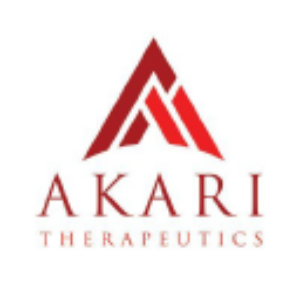Akari Therapeutics’ Accepted Abstract Showcasing its Novel Splicing-Targeted ADC Payload Driving Immune Activation Now Available
Rhea-AI Summary
Akari Therapeutics (Nasdaq: AKTX) announced its SITC 40 abstract and presentations on November 7 and 9, 2025 describing preclinical immune mechanism data for its novel ADC payload PH1.
The company reports that a Trastuzumab–PH1 ADC produced higher rates of complete colon-tumor regressions versus a comparator microtubule-inhibitor ADC when combined with an anti‑PD‑1 checkpoint inhibitor. The PH1 combination is attributed to neoantigen-driven immune activation, antigen-presenting cell, B-cell and T-cell engagement, and expansion of tumor‑killing gamma‑delta T cells. Poster and oral presentation details and times are provided for the SITC Annual Meeting.
Positive
- None.
Negative
- None.
News Market Reaction
On the day this news was published, AKTX gained 13.10%, reflecting a significant positive market reaction. Argus tracked a peak move of +35.4% during that session. Argus tracked a trough of -21.5% from its starting point during tracking. Our momentum scanner triggered 31 alerts that day, indicating elevated trading interest and price volatility. This price movement added approximately $3M to the company's valuation, bringing the market cap to $29M at that time. Trading volume was exceptionally heavy at 43.8x the daily average, suggesting very strong buying interest.
Data tracked by StockTitan Argus on the day of publication.
Data to be presented at the 40th Annual Society for Immunotherapy of Cancer (SITC) Meeting on November 7th and 9th
BOSTON and LONDON, Nov. 04, 2025 (GLOBE NEWSWIRE) -- Akari Therapeutics, Plc (Nasdaq: AKTX), an oncology biotechnology company developing novel payloads for antibody drug conjugates (ADCs), today announced its abstract highlighting immune mechanism-of-action data for its novel ADC payload, PH1. The abstract is now available on the 40th Annual SITC Meeting website, and the Company will present the abstract in oral and poster presentations at the SITC Annual Meeting being held November 5-9, 2025 in National Harbor, MD.
Utilizing its innovative ADC payload platform, Akari is advancing a new class of immuno-oncology ADCs built on the platform of a novel PH1 payload, a spliceosome modulator that has a unique preclinical efficacy and safety profile with the potential to address unmet need for oncology patients singly or in combination with checkpoint inhibitors.
The full SITC abstract, which included 2 figures, is now available here with the results summarized as follows:
In this work, Akari investigates the mechanism behind preclinical colon tumor regressions induced by a Trastuzumab PH1 ADC with/without anti-PD-1 and contrasts that against a first-in-class ADC with a microtubule inhibitor payload. A higher rate of complete regressions in the PH1 ADC combination vs comparator ADC combination is attributed to an immune response stimulated by neoantigen, activation of antigen-presenting cells, B, and T-cells, and a mechanistic synergy between the PH1 payload and the checkpoint inhibitor. Interestingly, while neither single agent induced gamma-delta T cells, a kind of T-cell that is not limited by low neoantigen expression in tumors or low numbers of antigen-presenting cells, the PH1 ADC together with anti-PD-1 agent expanded this tumor-killing T-cell population.
Further details will be released in the poster and oral presentations. Details are as follows:
Title: A Novel Splicing-Targeted ADC Payload Drives Immune Activation, Synergy with Checkpoint Inhibitors, and Enhanced Therapeutic Potential beyond Cytotoxicity
Presenter: Satyajit Mitra Ph.D., Executive Director, Head of Oncology at Akari Therapeutics
Abstract No: 951
Poster Session: Exhibits & Poster Viewing 1 & 2
Date and Time: Friday, November 7, 2025,11:30 AM-12:15 PM ET and 5:35 PM-7:00 PM ET, respectively
Location: Prince George ABC Exhibit Halls, Gaylord National Resort and Convention Center.
Oral Session: 302 Beyond Cytotoxic Chemotherapy: the Next Generation of ADCs for Immune Modulation
Date and Time: Sunday, November 9, 2025, 11:05-11:20 AM ET
Location: Gaylord National Resort and Convention Center – Ballroom Level – Potomac Ballroom
For more information about the SITC Annual Meeting, please visit sitcancer.org. Additionally, for those registered to attend the conference, if you would like to schedule a meeting with Akari, please contact AKTX@jtcir.com.
About Akari Therapeutics
Akari Therapeutics is an oncology biotechnology company developing next-generation spliceosome payload antibody drug conjugates (ADCs). Utilizing its innovative ADC discovery platform, the Company has the ability to generate ADC candidates and optimize them based on the desired application to any target of interest. Akari’s lead candidate, AKTX-101, targets the Trop2 receptor on cancer cells and with a proprietary linker, delivers its novel PH1 payload directly into the tumor. Unlike current ADCs that use tubulin inhibitors and DNA damaging agents as their payloads, PH1 is a novel payload that is a spliceosome modulator designed to disrupt RNA splicing within cancer cells. This splicing modulation has been shown in preclinical animal models to induce cancer cell death while activating immune cells to drive robust and durable activity. In preclinical studies, AKTX-101 has shown to have significant activity and prolonged survival, relative to ADCs with traditional payloads. Additionally, AKTX-101 has the potential to be synergistic with checkpoint inhibitors and has demonstrated prolonged survival as both a single agent and in combination with checkpoint inhibitors, as compared to appropriate controls. The Company is generating validating data on its novel payload PH1 to continue advancing its lead asset, as well as other undisclosed targets with this novel payload.
For more information about the Company, please visit www.akaritx.com and connect on X and LinkedIn.
Cautionary Note Regarding Forward-Looking Statements
This press release includes express or implied forward-looking statements within the meaning of Section 27A of the Securities Act of 1933, as amended, and Section 21E of the Securities Exchange Act of 1934, as amended, about the Company that involve risks and uncertainties relating to future events and the future performance of the Company. Actual events or results may differ materially from these forward-looking statements. Words such as “will,” “could,” “would,” “should,” “expect,” “plan,” “anticipate,” “intend,” “believe,” “estimate,” “predict,” “project,” “potential,” “continue,” “future,” “opportunity” “will likely result,” “target,” variations of such words, and similar expressions or negatives of these words are intended to identify such forward-looking statements, although not all forward-looking statements contain these identifying words. Examples of such forward-looking statements include, but are not limited to, express or implied statements regarding the ability of the Company to advance its product candidates for the treatment of cancer and any other diseases, and ultimately bring therapies to patients. These statements are based on the Company’s current plans, estimates and projections. By their very nature, forward-looking statements involve inherent risks and uncertainties, both general and specific. A number of important factors, including those described in this communication, could cause actual results to differ materially from those contemplated in any forward-looking statements. Factors that may affect future results and may cause these forward-looking statements to be inaccurate include, without limitation: the Company’s need for additional capital; the potential impact of unforeseen liabilities, future capital expenditures, revenues, costs, expenses, earnings, synergies, economic performance, indebtedness, financial condition and losses on the future prospects, business and management strategies for the management, expansion and growth of the business; risks related to global as well as local political and economic conditions, including interest rate and currency exchange rate fluctuations; potential delays or failures related to research and/or development of the Company’s programs or product candidates; risks related to any loss of the Company’s patents or other intellectual property rights; any interruptions of the supply chain for raw materials or manufacturing for the Company’s product candidates, including as a result of potential tariffs; the nature, timing, cost and possible success and therapeutic applications of product candidates being developed by the Company and/or its collaborators or licensees; the extent to which the results from the research and development programs conducted by the Company, and/or its collaborators or licensees may be replicated in other studies and/or lead to advancement of product candidates to clinical trials, therapeutic applications, or regulatory approval; uncertainty of the utilization, market acceptance, and commercial success of the Company’s product candidates; risks related to competition for the Company’s product candidates; and the Company’s ability to successfully develop or commercialize its product candidates. While the foregoing list of factors presented here is considered representative, no list should be considered to be a complete statement of all potential risks and uncertainties. More detailed information about the Company and the risk factors that may affect the realization of forward-looking statements is set forth in the Company’s filings with the SEC, copies of which may be obtained from the SEC’s website at www.sec.gov. The Company assumes no, and hereby disclaims any, obligation to update the forward-looking statements contained in this press release except as required by law.
Investor Relations Contact
JTC Team, LLC
Jenene Thomas
908-824-0775
AKTX@jtcir.com








